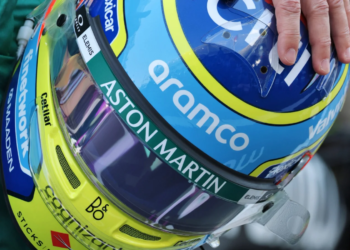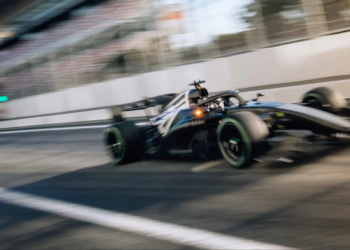Formula 1 has experienced a dramatic decline in social media mentions, growth and reach according to a new research study, which attributes the fall-off to Red Bull’s total domination of the 2023 season.
The study led by London-based social intelligence group Buzz Radar found that F1’s social engagement figures had declined for the first time since 2018.
Figures had been growing year-on-year until peaking in 2022. However, social media mentions have declined 70.7%, new followers are down 49.2% and overall social media reach dropped 64.1% this season according to the study published on Thursday.
In it’s whitepaper, titled Have we reached Peak F1?, Buzz Radar analysed over 70 million fan posts on social media using a combination of human analysis and AI data which pointed to the first decline of interest in recent years.
The following data, published in the report by Buzz Radar, reflects F1’s social media trends between January and May for the past three years.
| 2021 | 2022 | 2023 | |
|---|---|---|---|
| Mentions | 3.19m | 6.14m | 1.83m |
| New Followers | 624.27k | 911.15k | 489.37k |
| Social Reach | 35.63bn | 61.73bn | 22.16bn |
Off the back of record growth across the board, Buzz Radar predicts that F1 could ‘lose as much as 50%’ of the new audience it has gained by 2024 if a single driver continues to dominate the sport.
After an analysis of fan tone on social media, Buzz Radar also reported that descriptors such as ‘boring’ and ‘disappointing’ were growing more prominent in online F1 discourse.
“The data comparison between 2022 and 2023 revealed significant drops in the overall mentions of F1, along with dismal numbers in the growth of new followers of high-profile accounts,” the report concluded.
“The social data from 2023 also offered insight into a fundamental shift in conversation about F1: a noticeable upswing in the use of negative adjectives associated with the sport.
“Words like ‘boring’ and ‘annoying’ are now becoming high-frequency descriptors, replacing erstwhile positive words like ‘interesting’ and ‘exciting’.”
The report attributes the declining popularity of the sport to single-team domination with similar trends being observed during Mercedes’ eight-year reign. F1’s last major popularity drop coincides with Lewis Hamilton’s domination of the 2018 championship.
“There is a clear pattern in F1, as there is in most sports. The closer the competition, the more people are excited to talk about F1,” it was argued.
“This large contingent of new fans of the sport are expecting the excitement levels to be consistent with 2021, and are more likely to drop off when the competition for the championship is less intense.
“2016 was the most talked about season, until 2021, despite all the contributory factors of the Liberty takeover, Drive to Survive, and lockdown, because [Nico] Rosberg and Hamilton were battling closely.
“The season was decided by only five points. Conversation stagnated between 2018-2020 while Hamilton dominated, and grew significantly again during the 2021 season; the closest championship since 2016.
“Both 2016 and 2021 seasons were decided at the last race. 2022 continued to ride the wave of the close competition at the end of 2021, but now we are seeing the result of one driver dominance once again.
“2023 is now on course to continue losing conversation, and this pattern will continue until the racing becomes closer again.”

Red Bull wrapped up the Constructors’ Championship last time out in Japan with six races to spare after taking 15 out of 16 wins in 2023. Championship leader Max Verstappen has won all but three grands prix to date and looks set to claim a third consecutive Drivers’ title in Qatar.
“Interest declines when one driver starts to dominate week-on-week. The excitement and unpredictability of the sport starts to ebb away, and if Liberty don’t find a way to stop it, so will the support of fans.
“A predictable sport, after all, is no fun at all. For F1 to thrive, it needs to recapture the magical formula of wheel-to-wheel racing between multiple top drivers vying for supremacy.”
However, FOM has refuted the findings of Buzz Radar‘s study, saying that growth on its official channels is around eight times greater than the figure mentioned in the report covering the same January to May time period.
FOM also stated that active engagement data (likes, comments and shares) are so far 4% greater compared to 2022 and are set to exceed 1.5bn by the end of the season.










Discussion about this post